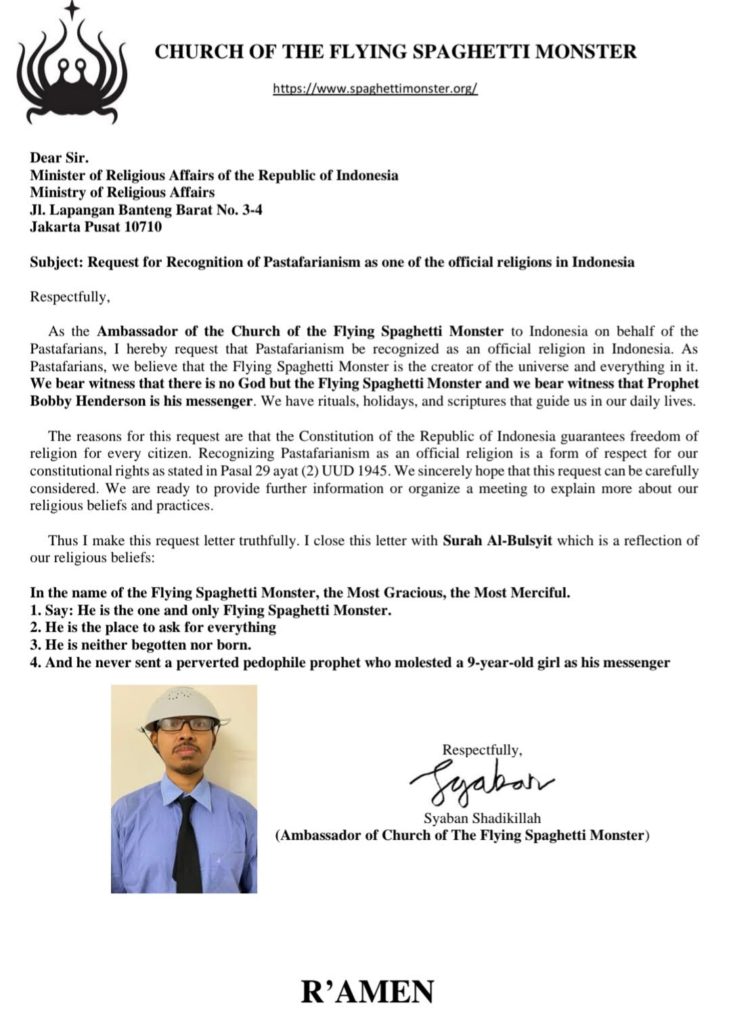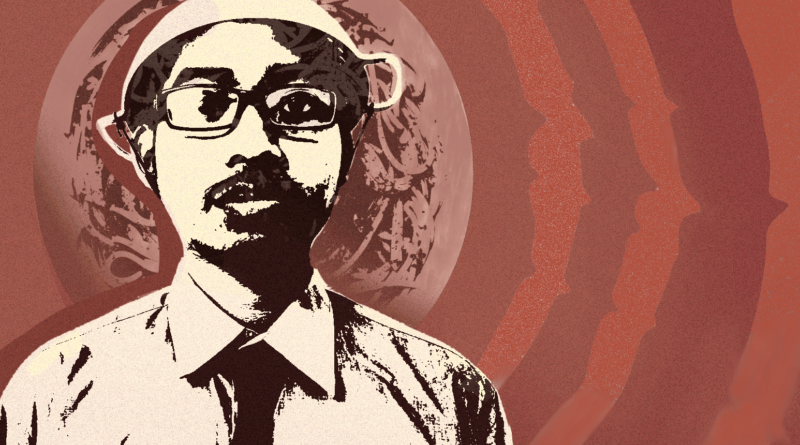R’Amen: When Belief in Spaghetti Leads to Cyber Patrol and Exile
Warning: mysqli_num_fields() expects parameter 1 to be mysqli_result, bool given in /var/www/vhosts/studentenkrant.org/httpdocs/wp-includes/class-wpdb.php on line 3868
Grant, the Flying Spaghetti Monster, thy sauce;
and in sauce, noodles;
and in noodles, meatballs;
and in meatballs, knowledge;
and from knowledge, knowledge of what is tasty;
and from knowledge of what is tasty, the love of spaghetti;
and from spaghetti, the love of the Flying Spaghetti Monster.
R’Amen
–The Official Pastafarian Prayer Book, “Prayer of Knowledge”
A mass of spaghetti with two meatballs and eyestalks, also known as the Flying Spaghetti Monster, created the universe. While being drunk, of course. Pirates used to give candies to children and death is no longer scary because a beer volcano and a stripper factory are waiting for us in the afterlife. Too good to be true? I also thought so the first time I entered the world of the Church of the Flying Spaghetti Monster, also known as Pastafarianism — a satirical belief system founded in 2005 by Bobby Henderson.
What motivates people to honor His Nobility — the Flying Spaghetti Monster (FMS) — and proudly wear colanders on their heads? No one can answer these questions better than Pastafarians themselves.
Being curious to find out, I created an anonymous questionnaire that was filled out by 45 dedicated Pastafarians. I also had an opportunity to interview Syaban Shadikillah, a Pastafarian from Indonesia, who was forced into exile by the government for honoring spaghetti.
“I am being hunted by the Cyber Patrol of the Indonesian police at this very moment for openly worshipping my Spaghetti God,” shared Shadikillah.
The recipe for a Noodly Faith
Before diving into the story of this follower of His Noodly Majesty, let’s first explore the key ingredients that give this belief system its unique flavor, according to those who live by it.
Note: More detailed instructions can be found in the Pastafarianism Bible (Gospel).
You will need:
- 1 cup of satire; humour in Pastafarianism is used to challenge traditional religious norms. It was the top-rated ingredient among the 45 anonymous believers.
- 3 tablespoons of pirates as a chosen people; pirates are considered the original pastafarians. Pastafarians believe that the decline in pirate numbers since the 19th century has led to global warming. The fewer the pirates, the hotter the planet. Coincidence? The Flying Spaghetti Monster thinks not.
- A sprinkle of colander-wearing holiness; forget Hijabs and Turbans. For Pastafarians, the colander isn’t just for draining spaghetti, it’s a symbol of their religious identity. Worn proudly as a symbol of faith, it represents freedom of belief, satire, and the idea of not taking everything too seriously.
- 2 tablespoons of beer volcano and stripper factory; it is not a metaphor. It’s heaven, Pastafarian-style. An eternal paradise with flowing beer volcanoes and stripper factories is waiting for you after death.
- A pinch of kindness; as one follower mentioned: “In conventional religion, belief is more important than being a good person, but in Pastafarianism, being a good person is more important than belief.” Even if you don’t believe in a noodly creator, kindness is still the holiest ingredient of all.
- Bonus ingredient: universal recognition (used by almost all Pastafarians): The majority of pasta activists strongly advocated for the recognition of Pastafarianism globally. As was emphasized by one: “FSM was drunk while creating the world; that explains better all the disasters and evil we live in. We don’t have a pretty boy as a savior, we have a spaghetti monster instead.” Makes sense. If the world was built by a sober being, we really need a refund.
From Spaghetti Gods to exile: Syaban Shadikillah and Indonesian Cyber Patrol
Pastafarianism might seem as simply a tasty mix of humor, freedom, and pasta, but for some, it can get pretty serious — especially when the Indonesian government starts sending the Cyber Patrol after you.
I first came across Syaban Shadikillah in a Pastafarian Facebook group, where he shared that his letter to the Indonesian government concerning recognition of Pastafarianism led to him going into exile. Intrigued by his story, I reached out, and was glad he agreed to take part in an online interview.
On April 9, 2025, despite being on opposite sides of the world — he in Australia and I in Lithuania — we sat down for a virtual conference about the Flying Spaghetti Monster, satire, and freedom of religion. During the interview, Shadikillah, in true Pastafarian style, wore his signature colander on his head, embracing the symbol of his faith with pride. When asked whether he wears the utensil all the time, he explained that Pastafarianism isn’t dogmatic: the colander isn’t a requirement, but a personal choice and a symbol of identity.
“The most fascinating thing about religion is that it is open to everyone. There is no such thing as being heretical, everyone is welcome and respected,” he said. Practicing faith according to him is equally simple: “Most of us celebrate our religion by gathering together and eating spaghetti.” No complicated rituals; just carbs, sauce, and good company.
It is also important to note that the religion doesn’t have hierarchical structures, to become a Pastafarian is even easier than boiling spaghetti: “You can join our religion at this very moment” Shadikillah pointed out. In fact, if you would like to go even further and become a Pastafarianism priest, that’s possible too. All it takes is a willingness to learn a few sacred truths and maybe invest in a good colander.
While the practice of the noodly faith may be simple, getting recognition for it tangled things up a bit.
On January 4, 2025, being a dedicated Pastafarian, Shadikillah wrote a satirical letter addressed to the ministry of religious affairs in Indonesia, aiming for recognition of the Church of the Flying Spaghetti Monster. “The State should treat all religions equally,” he emphasized.

What the Pastafarianism activist got in return, unfortunately, wasn’t a warm bowl of pasta. He was reported to the police, bombarded with hate, and received serious threats. Some Indonesians claimed that he violated a so-called Anti-Blasphemy law that bans public insults against religion and carries up to 5 years imprisonment. Spaghetti, unfortunately, was considered a threat to national stability.
“They just want to get me! The second I enter Indonesian jurisdiction, I am done; they will arrest me! We have Cyber Patrol in Indonesia to control political and social discourse; this is how dystopian it was,” he said.
Faced with such hostility, Shadikillah chose to go into exile in Australia. Believing in spaghetti had unexpectedly turned him into a political outcast. “The best for me is to stay outside Indonesian territory for now,” explained the FSM follower.
When asked why Indonesia reacted so aggressively, he replied that the answer lies in the conservative nature of the country’s cultural norms.
The bright side, however, is that Australians are much more open to pasta God than Indonesians. “Here, we have a community,” he said. “Someone compliments my hat, and I get to explain, ‘Oh no, it’s not just a hat, it’s a colander — a symbol. I’m a Pastafarian,’ and they check it out.” Shadikillah also noted that in Australia Pastafarians go on a pilgrimage, gathering together to celebrate their beliefs.
When asked whether he would like to stay in Australia, as the country is much more open to The Flying Spaghetti God compared to Indonesia, the Pastafarian hesitated: “I am not sure, but the problem is, even if I wanted to, I might not be able to return.” The reason — as you might have already guessed— is the Indonesian Cyber Patrol: a government surveillance unit that reminds me more of a dystopian movie than real life.
Despite the difficulties Shadikillah faced, he continues to stand by his faith. His ultimate goal is the recognition of Pastafarianism globally, as he believes it should be treated as any other religion.
When asked what message he would like to send to other Pastafarians who are fighting for their rights, FSM followers responded: “My message is to not be afraid to wear your colander; if a teacher or the police say you have to remove it, they are wrong. Everyone has the right to practise whatever they want to believe; you should fight for your rights”.
These words are a powerful reminder to preserve individuality and not to give up on your beliefs, no matter how noodly or unconventional they may seem. There is enough horror in the world, so why not add a bit of humour and embrace a pasta-powered rebellion?
After all, if you can’t stand for spaghetti, what can you stand for?
R’Amen.
Sources:
https://ohmyfacts.com/religion-history/25-facts-about-pastafarianism/
The Gospel of the Flying Spaghetti monster The Gospel Of The Flying Spaghetti Monster : Free Download, Borrow, and Streaming : Internet Archive

